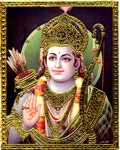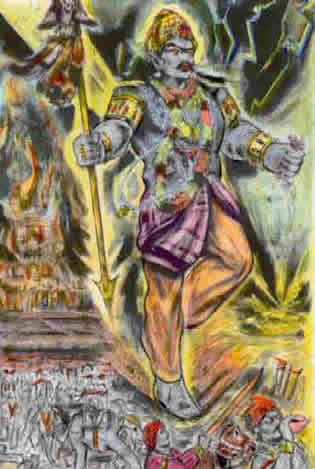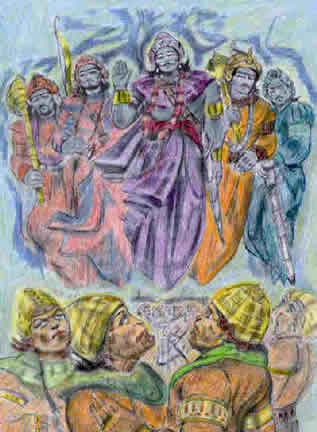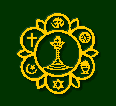Chapter
8(b)
The Siege
 Finding
no means of escape, and overcome by affection for the
brother, Kumbhakarna got ready. They placed cauldrons of
toddy and mounds of meat before him, so that he might
breakfast on them. Gulping the whole lot in a moment,
Kumbhakarna proceeded to the battlefield. Seeing him
enter the fray, Vibhishana, his younger brother, ran
forward from Rama's camp and fell at his feet in humble
reverence. Rising up, he announced himself by name.
Kumbhakarna beamed in joy; he embraced his brother with
loving tenderness. Vibhishana was the first to speak. He
said, "Brother! Ravana insulted me in open court and
kicked me out of the Audience Hall. I considered all
aspects of this affair and counseled him in various ways.
He discarded my advice and gave ear to power-mad foolish
ministers; he hurled unbearable abuses on me, within the
hearing of those persons. I could not suffer the shame of
it. I surrendered to Rama, and, knowing that I was
helpless and innocent, he accepted me and granted me
refuge". At this, Kumbhakarna replied, "Well, Brother!
The shadow of Death is already on Ravana. How then can he
pay heed to good counsel? Surely, you have done well to
fulfill the goal of your life. You are not Vibhishana
now, you are Vibhushana (the shining jewel, the most
splendid ornament) of the Rakshasa clan! You have
ennobled and purified the clan by serving so ardently the
very Ocean of Happiness, the Crown of the
Raghu Dynasty,
Rama. Go. Serve him with sincere zeal. Brother! I have to
engage in battle regardless of the fate in store for me.
I am also nearing Death. Ravana knows that my heart is
not with him. I advise you to give up loyalty to this
side or that, but, confine yourself to loyalty to Rama".
Receiving this advice and the blessings of his brother,
Vibhishana returned to the presence of Rama. He told
Rama, "Lord! That mountain of a Rakshasa is Kumbhakarna;
he is a ferociously brave fighter. He has come to engage
you in battle".
Finding
no means of escape, and overcome by affection for the
brother, Kumbhakarna got ready. They placed cauldrons of
toddy and mounds of meat before him, so that he might
breakfast on them. Gulping the whole lot in a moment,
Kumbhakarna proceeded to the battlefield. Seeing him
enter the fray, Vibhishana, his younger brother, ran
forward from Rama's camp and fell at his feet in humble
reverence. Rising up, he announced himself by name.
Kumbhakarna beamed in joy; he embraced his brother with
loving tenderness. Vibhishana was the first to speak. He
said, "Brother! Ravana insulted me in open court and
kicked me out of the Audience Hall. I considered all
aspects of this affair and counseled him in various ways.
He discarded my advice and gave ear to power-mad foolish
ministers; he hurled unbearable abuses on me, within the
hearing of those persons. I could not suffer the shame of
it. I surrendered to Rama, and, knowing that I was
helpless and innocent, he accepted me and granted me
refuge". At this, Kumbhakarna replied, "Well, Brother!
The shadow of Death is already on Ravana. How then can he
pay heed to good counsel? Surely, you have done well to
fulfill the goal of your life. You are not Vibhishana
now, you are Vibhushana (the shining jewel, the most
splendid ornament) of the Rakshasa clan! You have
ennobled and purified the clan by serving so ardently the
very Ocean of Happiness, the Crown of the
Raghu Dynasty,
Rama. Go. Serve him with sincere zeal. Brother! I have to
engage in battle regardless of the fate in store for me.
I am also nearing Death. Ravana knows that my heart is
not with him. I advise you to give up loyalty to this
side or that, but, confine yourself to loyalty to Rama".
Receiving this advice and the blessings of his brother,
Vibhishana returned to the presence of Rama. He told
Rama, "Lord! That mountain of a Rakshasa is Kumbhakarna;
he is a ferociously brave fighter. He has come to engage
you in battle".
 When
the Vanaras heard these words, they were so angry that
they spouted fire and leaped under the leadership of
Hanuman on the enemy forces. They threw huge trees and
enormous boulders at him. But, Kumbhakarna stood firm and
unaffected. The Vanara attack was like hitting a mad
elephant with an eyelash! Boiling with anger, Hanuman
administered a mighty blow with his clenched fist and
Kumbhakarna reeled. But, recovering soon he returned the
blow, and felled him to the ground. Nala and Nela now
joined the fight; they too could not withstand the might
of Kumbhakarna. Fear seized the Vanara hordes. Sugriva
and Angada had their share of the mighty Kumbhakarna's
onslaught and they rolled on the ground. At last,
Kumbhakarna squeezed Sugriva under his arm and carried
him off the field. Kumbhakarna asserted that, by carrying
the King off, he had vanquished the Vanara
Army. [See
also: SB, Canto 7, chapter
10:36,37]
When
the Vanaras heard these words, they were so angry that
they spouted fire and leaped under the leadership of
Hanuman on the enemy forces. They threw huge trees and
enormous boulders at him. But, Kumbhakarna stood firm and
unaffected. The Vanara attack was like hitting a mad
elephant with an eyelash! Boiling with anger, Hanuman
administered a mighty blow with his clenched fist and
Kumbhakarna reeled. But, recovering soon he returned the
blow, and felled him to the ground. Nala and Nela now
joined the fight; they too could not withstand the might
of Kumbhakarna. Fear seized the Vanara hordes. Sugriva
and Angada had their share of the mighty Kumbhakarna's
onslaught and they rolled on the ground. At last,
Kumbhakarna squeezed Sugriva under his arm and carried
him off the field. Kumbhakarna asserted that, by carrying
the King off, he had vanquished the Vanara
Army. [See
also: SB, Canto 7, chapter
10:36,37]
Meanwhile, Hanuman
regained awareness of the state of things; he found
Sugriva was not around; so, he got anxious to discover
his whereabouts. While being carried away, pressed under
the arm of the mighty Kumbhakarna, Sugriva recovered
consciousness and he tried his best to wriggle out of the
hold. Hanuman found him engaged in this desperate bid and
ran to render him help. However, Sugriva separated
himself from his captor and started a valiant fight
against him. He bit off the nose and ears of Kumbhakarna,
and the monster had, as a consequence, enormous
difficulty to breathe. Soon, a horde of Vanaras yelling
"Victory to Rama" "Victory to our Master", surrounded
Kumbhakarna and rained rocks, hills and trees on him. The
infuriated demon leaped on the Vanaras and catching
whomsoever he could lay his hands on, he crunched them
and swallowed them. Many were crushed to death. Thus
Kumbhakarna was able to scatter the Vanaras in
panic.
At this, Rama told
Lakshmana and others that the time had come when he had
to enter the field; his intercession could not be delayed
any longer. "Lakhsmana! Bring that 'inexhaustible'
arrow-sheath hither", He said. Bearing the command of
Rama on his head, he brought the sheath immediately and
placed it in his brother's hands. Armed with the Kodanda
Bow, Rama walked into the battle area, like a lion
towards its prey. Lakshmana, Sugriva, Hanuman and
Jambuvan followed him. The arrows from Rama's bow flew
fast like winged serpents straight at the foe. They
spread all over the place and penetrated the four
quarters. They destroyed millions of heroes and warriors
in the enemy ranks. Unable to stand the onslaught of the
arrows, the Rakshasas fled. The stream of arrows never
got dry, every arrow that was shot returned back into the
same sheath after inflicting the injury intended.
Realizing that Rama was out to exterminate the Rakshasas
forces, Kumbhakarna was terribly enraged; he roared like
a wounded lion and jumped into the midst of the fray. The
Vanaras were alarmed; they fled in fear. Finding that no
other plan was feasible, Rama aimed an arrow at
Kumbhakarna and sliced off his hands at the shoulders. At
this, the monster shone like the Mandara Mountain, when
its wings were sliced off by the Lord of Gods, Indra. He
rushed towards Rama with a shriek. Rama drew the
bowstring full behind the ear and let go a bunch of
arrows under that struck with deadly force all over his
face. Kumbhakarna reeled at the impact but did not fall.
So, Rama shot another arrow which severed his head and
felled it to the ground. When the head was sliced off,
the trunk continued to run for some distance, and to
prevent this movement, Rama shot another arrow which cut
it in twain.
Suddenly, a splendour
arose from the body and advancing towards Rama merged in
him. The Rakshasa attained liberation without performing
any
Sadhana or
Japa
(Recitation of Name) or
Thapa
(Austerity for Sense Control and Mind-Control). While
alive, he shone like an incomparable hero on the
battlefield; dead, he attained the highest state of
Mergence with God. Rama stood on the field, with a
sprinkling of sweat drops on his lotus face; his body
revealed a few drops of Kumbhakarna's blood that had
fallen on it during the fight. It was the hour of dusk;
both armies had a fierce hot day of ferocious fight. So,
they retired into their camps. The Grace bestowed by Rama
reinforced the spirits of the Vanaras. Like fire fed by
dry grass, the flame of their ardour rose
high.
The Rakshasas lost
strength, night and day. Ravana bewailed inconsolably. He
was a cobra that had lost its crest-jewel. Pressing his
brother's severed head to his bosom, he wept aloud.
Meghanada, his son, tried to soothe him in various ways;
"Tomorrow I shall demonstrate before you my heroic might.
I shall, in a trice, smash this Vanara horde out of
shape. I shall confer on you joy immensely greater than
the grief you are burdened with today", he boasted. Very
soon, dawn broke. Ravana was informed by messengers that
the bears and monkeys had surrounded the city. This drew
the indomitable warriors among the Rakshasas into the
struggle; they marched forth to meet the enemy. Each
fought with whomsoever he encountered to the utmost of
his skill and strength. The whole of that day, the fury
was indescribably frightening. Meghanada ascended his
magic chariot and rose into the sky. His challenging roar
thundered like clouds in the doomsday sky. That roar
felled the Vanaras to the ground, as if by a mighty blow.
The earth shuddered at its echo. In a moment, he
contrived a pseudo-Sita and, seating her in the chariot,
he came down along the battlefield! Hanuman noticed this
before every one else. And accosting him, Meghanada
shouted, "Listen, Hanuman! This Sita, to recover whom,
you are waging this war, I am killing her this moment.
Look. With her death, this war must end", and, drawing
his sword, he cut her to pieces and cast them away,
Hanuman was plunged in vengeful rage; he called upon the
Vanaras to fight on, with no thought of survival, and
exterminate the Rakshasa brood. The Vanaras attacked them
so ferociously that the Rakshasas fell back into the
city.
Hanuman approached Rama
and reported to him the wicked deed performed by
Meghanada. As soon as he heard the news, Rama pretended
to be affected by it; he was not unaware of the fact that
it was a pseudo-Sita contrived through the magic skill of
the Rakshasas; still, he acted as if he was just a 'man
among men'. Lakshmana too was down with despair; he
grieved at the loss of the Mother of all the Worlds, and
sat despondent at the futility of continuing in this
world. Hearing reports of what had happened, Vibhishana
rushed to the presence of Rama. He said, "Master! You
know the truth of this. The entire incident is a fake.
Sita is alive and guarded with great care. Ravana alone
can have access to the place where she is kept under
guard. Meghanada has only designed a 'Sita' and killed
her in order to deceive us into despair. Among us
Rakshasas such tricks are very common; I know how they
revel in such mean stratagems". Rama and Lakshmana were
happy when they heard him, and they appreciated his
exposure of the secret tactics of the Rakshasas. In order
to confirm the statement of Vibhishana and to satisfy
himself all the more, Hanuman assumed another form and
entering Lanka City unnoticed by any one, he went to the
park where Sita was kept under guard, and returning, he
assured the Vanaras that all was well. This urged the
Vanaras to greater enthusiasm in battle.
 Meghanada
returned to the battle very soon. He rained on the
Vanaras this time not only sharp arrows, but spears,
maces, axes, pestles, and boulders. The Vanaras heard
terror-striking shouts and commands reverberating all
around them. "Beat", "Hold" etc., but they could not see
who were obeying those orders and beating them, hacking
them and holding them fast! It was an eerie experience
which spread confusion among them. They were unable to
decide whence the danger came and where they had to turn
for refuge. Even redoubtable heroes like Nala, Nila,
Angada and Hanuman were filled with fear. Meghanada aimed
arrows at Lakshmana, Sugriva and Vibhishana and pierced
their bodies. But they fought against him nevertheless
with unabated fury. Meanwhile, Meghanada engaged Rama
himself in battle. He showered hissing serpent-arrows on
him. It was the renowned Dragon Weapon, the Sarpastra.
And, Rama the Supreme Actor come in the Human Role, the
mighty Hero who destroyed Khara, Dooshana and their
phalanxes, allowed himself to be bound by the effects of
that powerful weapon, the Sarpastra! In order to give due
respect to that Divine Dragon and to demonstrate its
potency, he permitted it to harm him! This may seem
strange, but this is the story of Rama, come with
attributes, qualities, and limitations. So people with
limited capacities of thought, word and deed cannot
discover this Truth. The Vanaras were rendered helpless
and worried, because Rama had been overpowered by the
weapon of the Dragon. Meghanada was overjoyed; he rushed
among the Vanaras, spouting vulgar
abuse.
Meghanada
returned to the battle very soon. He rained on the
Vanaras this time not only sharp arrows, but spears,
maces, axes, pestles, and boulders. The Vanaras heard
terror-striking shouts and commands reverberating all
around them. "Beat", "Hold" etc., but they could not see
who were obeying those orders and beating them, hacking
them and holding them fast! It was an eerie experience
which spread confusion among them. They were unable to
decide whence the danger came and where they had to turn
for refuge. Even redoubtable heroes like Nala, Nila,
Angada and Hanuman were filled with fear. Meghanada aimed
arrows at Lakshmana, Sugriva and Vibhishana and pierced
their bodies. But they fought against him nevertheless
with unabated fury. Meanwhile, Meghanada engaged Rama
himself in battle. He showered hissing serpent-arrows on
him. It was the renowned Dragon Weapon, the Sarpastra.
And, Rama the Supreme Actor come in the Human Role, the
mighty Hero who destroyed Khara, Dooshana and their
phalanxes, allowed himself to be bound by the effects of
that powerful weapon, the Sarpastra! In order to give due
respect to that Divine Dragon and to demonstrate its
potency, he permitted it to harm him! This may seem
strange, but this is the story of Rama, come with
attributes, qualities, and limitations. So people with
limited capacities of thought, word and deed cannot
discover this Truth. The Vanaras were rendered helpless
and worried, because Rama had been overpowered by the
weapon of the Dragon. Meghanada was overjoyed; he rushed
among the Vanaras, spouting vulgar
abuse.
Jambuvan saw him. "O
you Vicious Worm! Stop", he cried. Meghanada brushed him
aside, saying. "Fie on you, I had ignored you so far, as
too old to deserve attention. Of what avail are your
words to me? Move away". He threw a trident at Jambuvan,
which was luckily caught by him and thrown back at
Meghanada himself. The aim was so correct and the throw
was so forceful, that the trident hit him straight on the
heart; the wounded man circled round himself a few times
and fell on the ground. Jambuvan rushed to where he fell;
he held the feet together and swung him round very fast
before he dashed him on the ground. "Now, say, whether I
am an old man. Judge whether I have strength of youth or
the weakness of old age". Jambuvan challenged Meghanada.
Meghanada did not die, he rose with great difficulty and
moved away. He had not fulfilled his boast, and so, he
felt ashamed to show his face before his father. He went
straight to a garden named Nikumbala, where many
Rakshasas had performed penance and endured austerities
in the past.
Four courtiers of
Vibhishana who were watching incognito the movements of
the enemy leaders came to know about this and they
reported the fact to him. He hurried to Rama and said,
"Master! I listened to a bit of news just now; Meghanada
is about to perform a malignant
Yajna to
propitiate evil powers. If he completes the ceremonials,
it will be hard to defeat him. We will have to hurl
obstacles". Rama appreciated the suggestion, and was
pleased with his words. He summoned Hanuman and Angada
and told them, "Brothers! Go! Disturb and disorganize the
Yajna which Meghanada is observing". He turned to
Lakshmana and said, "Lakshmana! You have to defeat this
fellow on the field of battle. Note that gods are
grieving on account of his iniquities". No sooner had he
ordered so, than Vibhishana, Sugriva and Hanuman - the
three - collected a huge force of Vanaras and followed
Lakshmana in order to give him support. Lakshmana armed
himself with the bow and the ever-full arrow-sheath, and
after prostrating before Rama, he moved out of the camp,
with Rama installed in his heart. Angada, Nala, Nila and
other generals walked behind Hanuman.
When they reached the
Nikumbala Park, they found the Sacrifice already on and
the flesh and blood of buffaloes being offered in the
ritual fire. So, they started disturbing the ceremonies.
Meghanada did not however desist; then they began to
loudly caricature the hymns uttered by them to propitiate
the Forces, but, that did not persuade the priests to
stop the rituals. So, the infuriated Vanaras rushed into
the sacrificial area, and catching Meghanada by the hair,
they pulled him to the ground and kicked him. Meghanada
took hold of the trident and pounced upon them. Angada
and Hanuman fell on him, and were hit with the trident.
The blow was so hard that both of them rolled on the
ground. Lakshmana came to their rescue; he broke the
terrible trident in two, Angada and Hanuman recovered
soon and hit Meghanada with all their strength. However,
the Rakshasa did not quail; he did not show any sign of
the impact. Lakshmana rained deadly arrows on him, as if
he were the God of Death come to kill him. Each one
attacked him as if raining thunder-bolts. So, using his
magic skill, Meghanada rendered himself invisible. He
assumed many a mysterious role and escaped. The patience
of Lakshmana ran out at last; he fixed sacred arrows on
his bow, and, invoking on it the might and majesty of
Rama aimed it at Meghanada, wherever he might be. That
arrow entered the heart of Meghanada and ended his life.
Since, he had in his mind, during the last moments the
image of Rama and Lakshmana, Angada, Hanuman and
Vibhishana extolled his bravery and the way he died.
Hanuman lifted his body lightly on his shoulders and
carrying it to the City Gate of Lanka, placed it there
and returned. Lakshmana approached Rama and prostrated at
his feet. Rama was pleased at his success; he listened to
the detailed narrative of the events at Nikumbala Park.
He fondled his brother with great affection.

contents
of this Vahini
|
previous
page
|
next page



